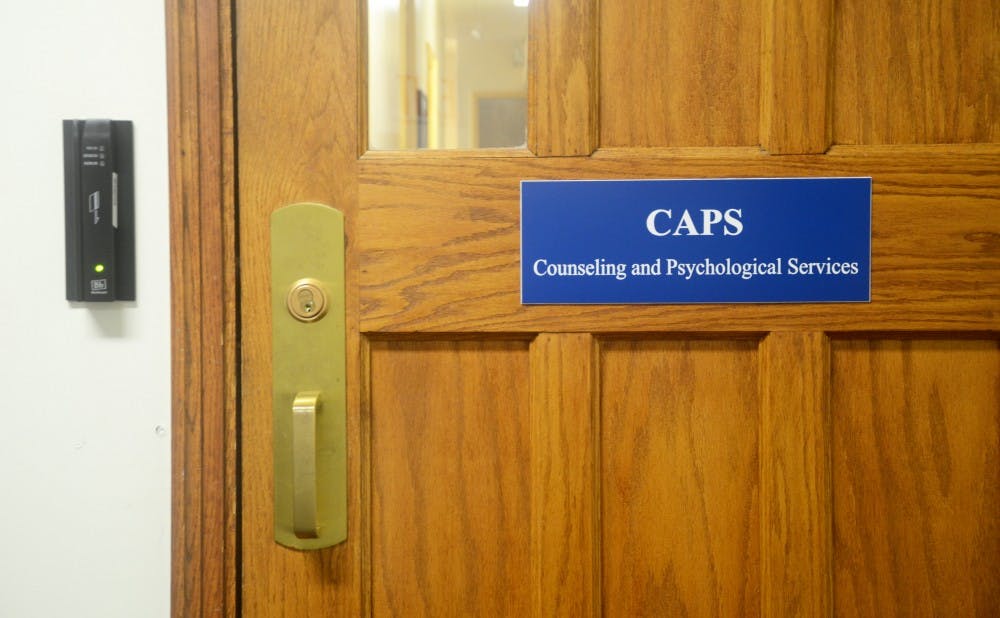In an effort to promote mental health awareness, Counseling and Psychological Services is expanding its partnerships with a variety of student organizations.
In 2006, CAPS did not have any alliances with student groups. They now have a dozen and counting—working with student organizations in order to connect with members of the community as directly as possible. CAPS administrators say the partnerships aim to improve the campus environment as a whole rather than addressing specific cases in individual sessions.
“It’s not a matter of who needs to go to CAPS, but who can benefit from CAPS,” said Gary Glass, CAPS associate director for outreach and developmental programming. “How can we also take what students gain from CAPS in confidential 50-minute sessions and actually offer that on a campus-wide level?”
When Glass joined CAPS in 2006, CAPS did not have any programs to support student organizations promoting mental health. CAPS's first partnership was with the Me Too Campaign, a predecessor of Me Too Monologues. From 2007 onward, CAPS has provided consultation, training and support to a variety of student organizations—including new student groups, graduate school programs and fraternities and sororities.
“Now I’d say that 30 percent of my time at least is working with students that want to make a difference in one way or another,” Glass said.
CAPS Director Wanda Collins said that outreach to student organizations was part of a broader effort by CAPS to promote mental health though programs that target the general student population.
“Part of the mission of CAPS is to try and support students in creating a caring culture on campus to combat some of the isolation and loneliness,” Collins said.
As CAPS has ramped up its partnerships with student organizations, the number of students who have used CAPS services has increased, growing by more than 10 percent over the past four years. Glass noted that partnerships may be partially responsible for this development, due to the awareness they raise about CAPS services.
“We want to increase the demand for services from those who are struggling but didn’t feel like they could ask,” Glass said. “But we want to see a decrease in the issues that are sort of the everyday life issues where students are not reaching out to each other.”
Student organizations may be more approachable than CAPS itself, Glass explained. In addition to broadly promoting mental health, having student organizations address mental health issues reduces the stigma associated with anxiety, relationship issues and other problems that students face on a day to day basis, Glass said.
“The construct of mental health or mental illness is insufficient, because a lot of the issues that bring students to CAPS [are] just life, and I don’t think we need to pathologize that,” he said.
Most of the support that CAPS provides involves training and advising. Glass is an adviser to several student organizations, including Peer for You and To Write Love on Her Arms.
Junior Isabella Kwai, co-president of Peer for You—which provides students with support from other students—said that CAPS has offered significant help to her organization.
“[Glass] helps to train our peer responders, the people who will be the ones that everyone messages on our site,” Kwai said.
Eddie Liu, a senior who leads Duke’s chapter of To Write Love on Her Arms—an organization that promotes awareness of mental health issues—noted that the chapter leadership meets with CAPS staff throughout the year.
CAPS also helps highlight issues that student organizations should be aware of and student organizations provide feedback to CAPS about issues on campus. Glass said the diverse range of student groups working on mental health issues helps bring mental health discussions to more segments of the campus population.
“There’s something to be gained from the more organic approach,” Glass said. “It capitalizes on the strength of our students, it capitalizes on the kindness of our students.”
A previous version of this article referred to Isabella Kwai as the co-founder of Peer for You. She is the co-president. The Chronicle regrets the error.
Get The Chronicle straight to your inbox
Signup for our weekly newsletter. Cancel at any time.

